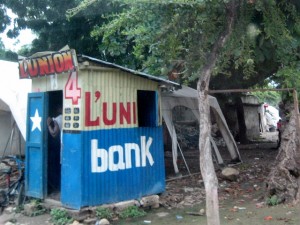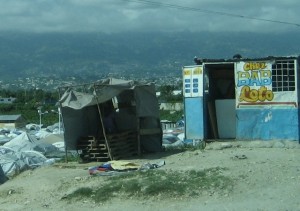Dreams of winning the lottery

Lottery ticket boutiques are colloquially referred to as a “banks,” because they will take “investment” wagers as small as a single goude. This “bank” is on the outskirts of Croix-des-Bouquets.
Last month, I was in North Carolina riding in the car with my friend Laura, when we passed “her 7-11″ convenience store. I say “her 7-11” because every Friday, without fail, she goes in and buys a lottery ticket, expectations low, but hopes high. Striking it rich would be a good way to end the week, after all. She pointed it out as we buzzed by and she told me, “Do you know, I have a friend that actually won a million dollars there. He did – ONE MILLION DOLLARS! He never goes to my 7-11, but he did that day, and he won. I hardly think that’s fair, do you?” She laughs, “I actually kind of feel like he won MY million dollars, though I do try to be nice about it.”
So who among us has not fantasized about winning the lottery? Wouldn’t it be great? Think of the possibilities, even after taxes! (Laura’s friend got $600K after the State of North Carolina took its cut.) Hope springs eternal the world over and Haitians are no different from the rest of us in their love affair with the possible. The dream persists – without regard for likelihood – that Lady Luck will smile, a jackpot will be won and luxury, comfort, and leisure will be delivered forthwith.
In Haiti, however, the dream seems somehow more desperate. It is estimated that Haitians spend between $1.5- 2 billion on the lottery every year, amounting to nearly one-quarter of the impoverished country’s GNP, and it is the Haitian poor that “invest” the most heavily. Starting at 1 goude/3 cents per number, it is often the only “investment” they can afford. However, because the Haitian State does not tax pay-offs, there is no tax revenue to put into state projects, such as infrastructure and educational development. Thus, when a Haitian player loses, he really loses. His goude is for naught.
Each lottery ticket comes with a set of three two-digit numbers. The idea is to choose one, two, or all three numbers correctly, with the pay-off being 50-1 for the first number, 20-1 for the second, and 10-1 for the third. Rather than approaching the lottery as a game of chance, however, Haitians employ a rather complicated strategy of dream interpretation to increase their odds of winning. Though the success rate is dubious, the reasoning flows somewhat logically. If the ultimate dream is to win the lottery, then one’s nightly dreams, correctly interpreted, will point the way.
In accordance with this method, elements in a dream such as a child or a chair or a feather, or whatever, all
correspond to a specific number. These numeric correlations are all documented in a book – available at every single borlette (Kreyol for lottery boutique) worth its salt – known as “tchala.” So, for example, if one observes a red feather prominently in a dream, one simply looks up the number assigned to red feathers in the tchala and there it is. The first wager thus becomes clear.
To the casual observer, this dream interpretation strategy may not seem like it would make much difference to whatever lottery gods there be. Perhaps, though winning isn’t entirely the point. As Pooja Bhatia put it so elegantly in her April 2010 article for myAiti.com, “The borlette allows Haitians to feel as though their dreams and ideas matter. As long as they dream, they will play.”
Contributed by Linda for Beyond Borders/It’s Cactus

